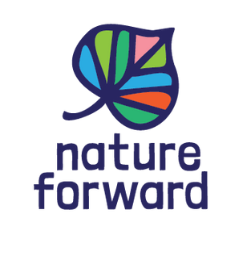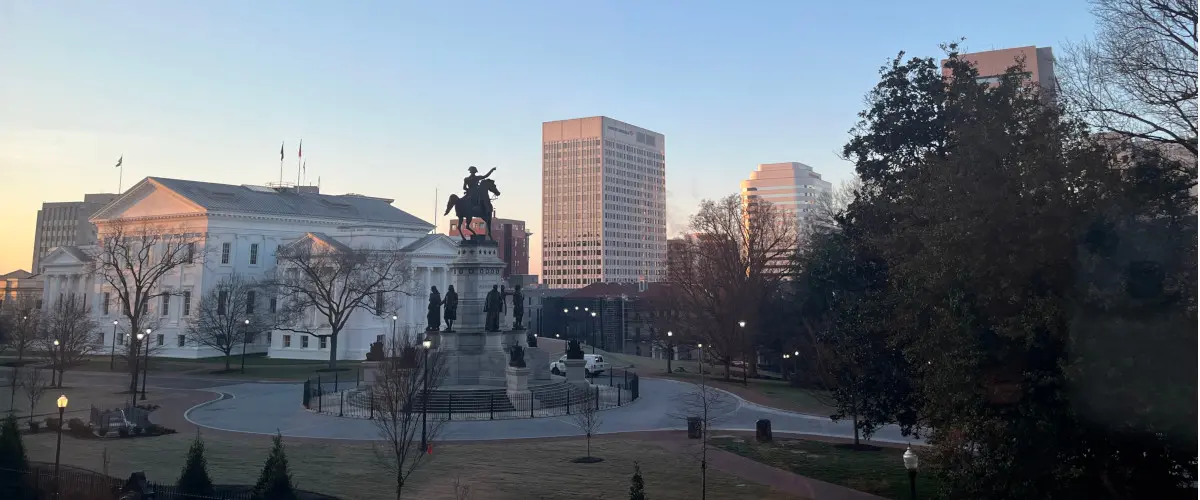How did the 2024 General Assembly go?
In this year’s General Assembly, Nature Forward selected a handful of bills to track dealing with natural resources / trees, solar energy, and data centers (read our prior blog post for bills and details). While there were some wins on the bills we tracked, overall, Virginia has a long way to go to tackle the energy challenges coming down the pike.
Overall stats
Nature Forward relies on our robust set of partners in the Virginia Conservation Network (VCN) to help us track state issues. In the 2024 General Assembly, VCN took positions on 179 bills. Of the 134 bills that VCN supported, only 41 have been signed into law (accounting for the 14 bills that were vetoed by the governor). Of the 35 bills that VCN opposed, 28 of them were defeated.
The General Assembly is also responsible for passing a budget, which it did in mid-May 2024. We were disappointed that the budget proposal to ensure Virginia’s continuation in the Regional Greenhouse Gas Initiative (RGGI) was not included in the final budget, but litigation is progressing to fight for returning Virginia to RGGI. In a positive sense, the budget does include fiscal support for resilience efforts, flood protection, conserving tree canopy, and reducing pollution in our waterways.
Wins for trees and solar
In terms of the trees and solar bills we tracked, we had two wins:
- Improvements in the conservation of trees during land development process (HB459)
- In this part of our state code (which only applies to locales in NOVA and only Fairfax County uses), we now (1) have more flexibility in how locales can use the tree planting fund which developers pay into when they remove trees – we can now also use the funds for stewardship as well (not just tree planting) and (2) provide incentives for developers to assess the current tree canopy before development plans are submitted and provide a plan to protect and conserve identified trees.
- Improvements in shared solar facilities (HB106)
- Changes to state code supports expanding Dominion’s shared solar program from 200 MW to 1.6 GW, ensures that 30% of the program’s capacity goes to low-income qualified customers, and incentives solar in low-impact locations such as rooftops, brownfields, landfills, or dual-use agricultural facilities.
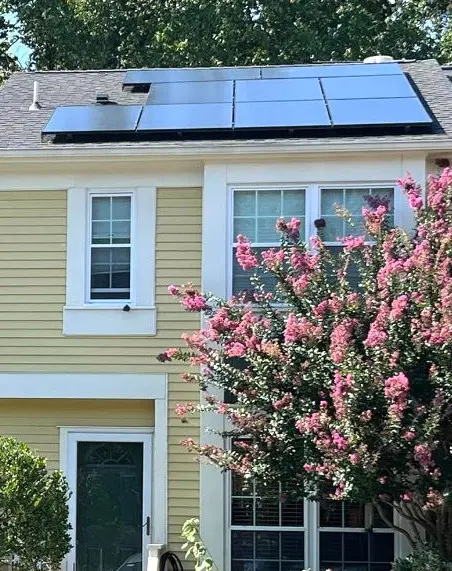
Photo credit: Renee Grebe
Losses: Lack of action on data centers
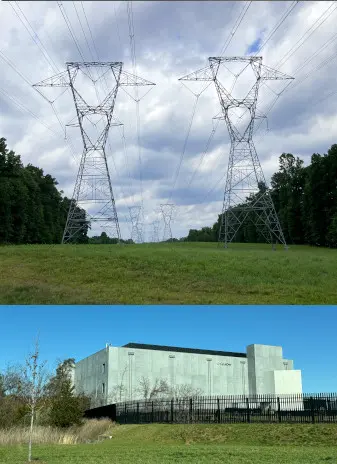
Photo credit: Ann Bennett (transmission lines) & Denisse Guitarra (data center)
The biggest disappointment in the bills we were tracking this year was the lack of action on every single data center related bill that came before legislators including (1) HB337 / SB284 (2) SB191 (3) HB116 / SB192 and (4) HB338.
The General Assembly has directed the Joint Legislative Audit and Review Commission (know as JLARC) to “review the overall impacts of the data center industry in Virginia and state and local policies regarding the industry”. This study will include impacts to natural and historical resources, a forecast of energy and infrastructure needs, a review of cost allocations and site considerations, impacts to local residents and ultimately whether existing tax incentives should be changed. For context, the state passed the first tax exemption for data centers in 2008. The exemption has been broadened several times and is a primary factor contributing to the industry’s expansion in Virginia. Between 2010 and 2017, data centers avoided over $400 million in state taxes.
A first for Nature Forward: Leading a bill!
This was the first year Nature Forward has been the lead advocacy organization for a state bill. With the partnership of Fairfax County resident Melinda Soltys, we helped craft bill language, and advocate for HB528, which would have allowed HOA residents the option to install conservation landscaping on their property. This bill was “continued to 2025” and Nature Forward’s Renee Grebe and Melinda Soltys will be presenting to a workgroup of the Virginia Housing Commission on June 5 in Richmond as the next steps.
Did you know that anyone can help introduce a bill? Read Melinda’s story below!
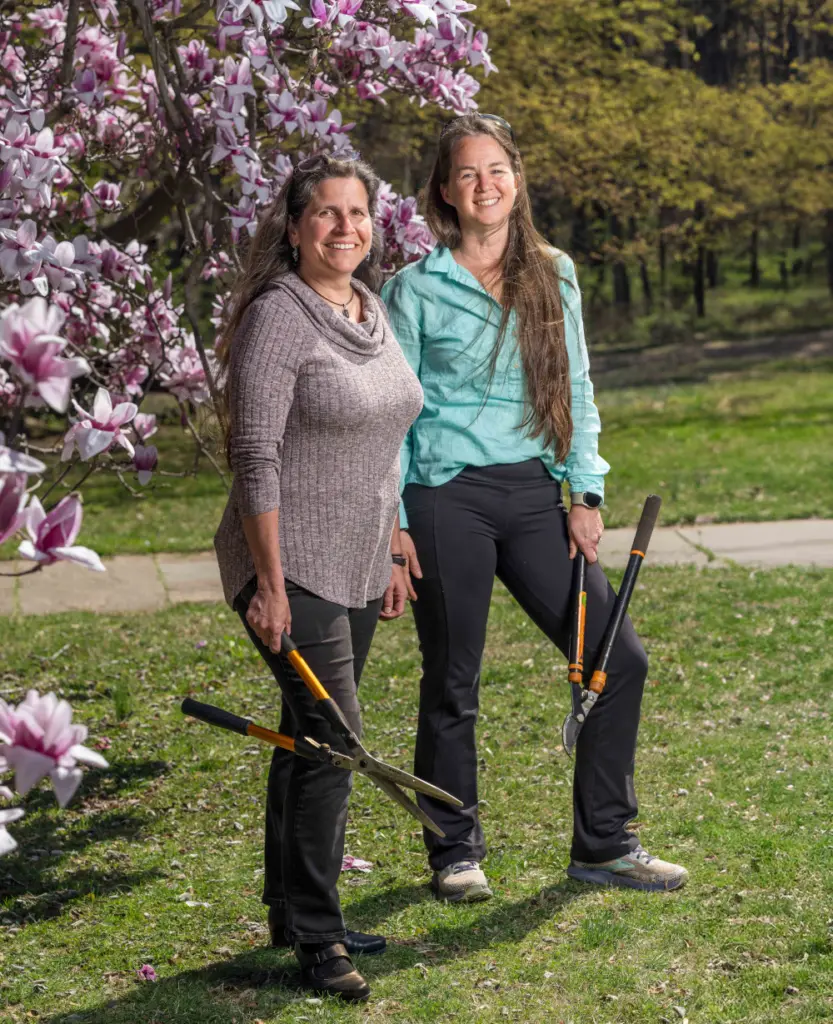
By Melina Soltys
I aced my son’s 8th-grade civics study guide, thanks to my recent experience in Richmond!
I’ve spent the last couple of years trying to help create a new law in Virginia to protect homeowners who want to do conservation landscaping in HOA communities. If my son had asked me to help him study two years ago before I started this process, I would have had to look up every single question. Back then, in frustration, I searched for “create a law in Virginia.” The response was pretty simple: Propose your bill to an interested legislative sponsor and you’re off and running. I had heard about similar bills being passed in Maryland and I was hopeful to do the same in Virginia.
Today, if you ask the same question using ChatGPT or another AI tool, you’ll find that there are more than 15 steps to creating a new law in Virginia. I worked hard to educate myself, and ultimately partnered with Renee Grebe of Nature Forward. By the time I arrived at the Virginia Assembly this year for VCN’s Conservation Lobby Day (on January 31, 2024), I was armed with a lot of new knowledge about how the legislative branch works. Walking into conservation day was still quite intimidating. But with VCN handling all of the logistics and bringing together such a wonderful group of like-minded folks in Richmond, all there for many of the same reasons, I felt supported and excited to be there. Speaking with other advocates, I learned about a Data Center that is proposed to be built just a couple miles from me. I also found out about issues and laws regarding tree conservation and volunteer duties that I hadn’t even been aware of.
There is something awe-inducing and inspiring about walking the halls of the General Assembly while it is in session. You can drop in on committee meetings and public hearings and literally watch laws being written. You can step up to the mic and speak to the matters at hand, sharing why these issues are important to you and why they should therefore be important to the General Assembly.
In support of HB528 (HOA Conservation Landscaping), Renee and I spent many long hours preparing for our time in front of the General Laws Committee. We negotiated with advocates with different views of our bill. We spoke with conservation lobbyists, non-profit organizations, Virginia lawmakers and their assistants. We talked with residents of other states who have created similar laws. We felt we prepared pretty well for what was to come. But at the last minute, despite our preparation, we asked the bill’s patron to pull the proposed bill from the docket because last-minute edits changed the intent of the bill. We had been told early on that it could take several years to create new legislation. As optimistic as we were, we knew it might come to this. I’ll come back to the General Assembly next year better informed and enthusiastic for the changes I can help create.
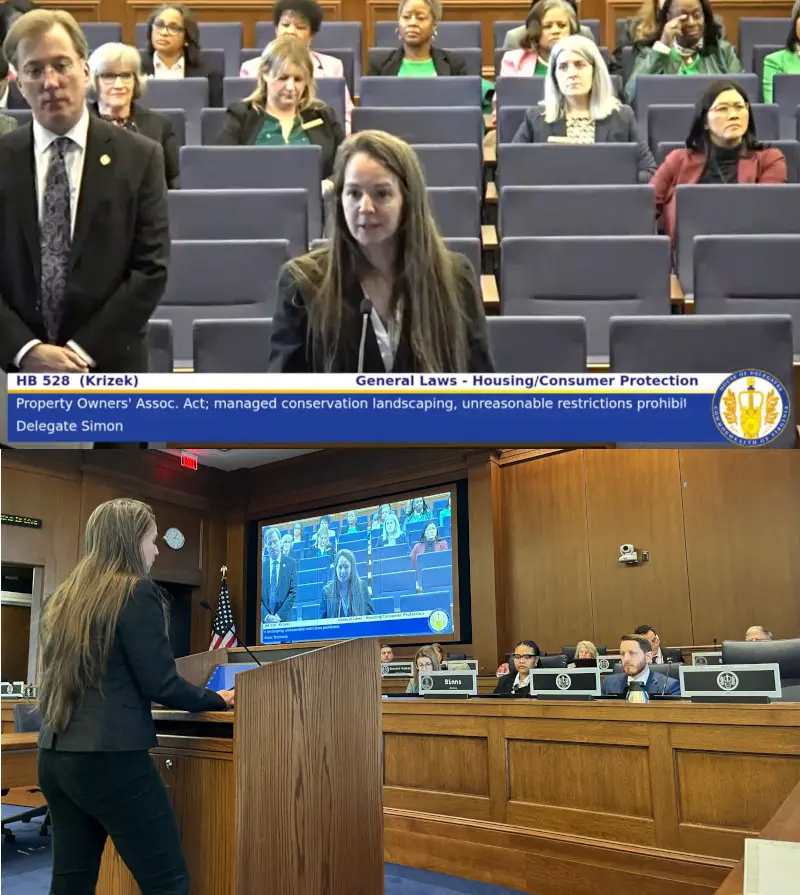
What my 8th-grade civics teacher was (probably) trying to teach me long, long ago was that one person can make a difference. Those lessons we learn in elementary school aren’t just useless filler – they are instructions on how we can all be part of the solution and move our government in the directions it needs to go.
Thanks to Melinda and all of the advocates who spoke up for laws that will help make Virginia more sustainable, resilient, and equitable! Keep talking to your legislators this summer and fall above the above issues and we’ll make sure to send out Action Alerts (sign up here if you aren’t on our mailing list) for any upcoming advocacy initiatives.
